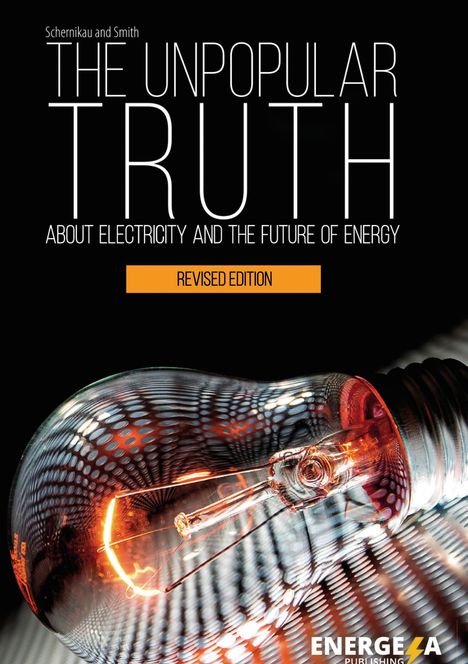Lars Schernikau: The Unpopular Truth about Electricity and the Future of Energy, Gebunden
The Unpopular Truth about Electricity and the Future of Energy
(soweit verfügbar beim Lieferanten)
- Verlag:
- BoD - Books on Demand, 06/2024
- Einband:
- Gebunden, HC gerader Rücken kaschiert
- Sprache:
- Englisch
- ISBN-13:
- 9783756807697
- Artikelnummer:
- 11110834
- Umfang:
- 156 Seiten
- Nummer der Auflage:
- 24003
- Ausgabe:
- 3. Auflage
- Gewicht:
- 408 g
- Maße:
- 226 x 160 mm
- Stärke:
- 13 mm
- Erscheinungstermin:
- 21.6.2024
- Hinweis
-
Achtung: Artikel ist nicht in deutscher Sprache!
Klappentext
The Unpopular Truth about Electricity and the Future of Energy Revised Edition - 2024.
Electricity is to modern civilization what blood is to the human body. Understanding how electricity works is more critical than ever as its importance grows with the increasing electrification of transport, industry, and heating.
Due to new reports and adjusted information being published, we revised our original book to reflect these updates, enabling us to bring you relevant information. - Lars Schernikau 2024
In this new book the authors explain the fundamental reasons for the energy shortages that the world (particularly Europe) started to experience in 2021, and which was exacerbated by Russia's invasion of the Ukraine in 2022. In doing so, the authors describe - in relation to our electricity markets - what could work and what won't.
This book is not only an introduction to modern electricity systems and electricity costs, but it also touches on primary energy and transportation. The authors focus more on the generation of electricity from a macroeconomic energy transition point of view and less on the details of how electricity physically works.
The environmental efficiency of our energy systems is more complex than CO2-emissions alone. Energy input, material input, lifetime, and recycling efficiency are other key elements discussed in the book. The book concludes with thoughts on the future of energy and suggestions for energy policy, taking into account the new challenges that come with global efforts to decarbonize.
Prof. Everett, energy economist, writes: Despite numerous policy initiatives and the expenditure of trillions of dollars on alternatives, fossil fuels remain the dominant source of energy throughout the world, and their use continues to grow in absolute terms. To understand the reasons for this seeming contradiction, Lars and Bill have compiled a complete overview of how the global energy economy actually works, as opposed to the way it is presented in popular media.
This is an invaluable reference work that should be on the bookshelf of anyone interested in energy policy, electricity markets, and environmental protection.
Topics covered in this book include: -Primary energy vs. electricity -Wind and solar (or what is revered to as variable renewable energy) -Capacity factors -Installed capacity vs. generated electricity -Hydrogen and batteries -Material input -Transmission and distribution -Heat pumps -Energy shortages and more
Anmerkungen:
Bitte beachten Sie, dass auch wir der Preisbindung unterliegen und kurzfristige Preiserhöhungen oder -senkungen an Sie weitergeben müssen.


